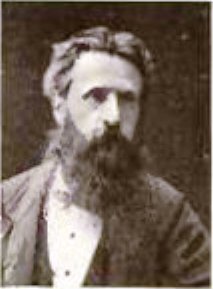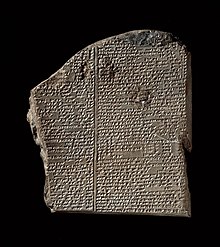George Smith (Assyriologist)
George Smith (born March 26, 1840 in London , † August 19, 1876 in Aleppo ) was a pioneering English Assyriologist . The discovery and first translation of the Gilgamesh epic , one of the oldest surviving literary poems of mankind, is attributed to him.
Life
Smith was born into a working class family in Victorian England, which limited his career opportunities and educational opportunities despite his skills. At the age of 14, he excelled in his training as a banknote engraver in a printing company. In his limited free time, he became increasingly fascinated by Assyrian culture and history and he began reading all available publications. While he continued to work in the printing business to support his wife and children, he was so interested that he often spent his lunch breaks at the British Museum studying cuneiform tablets . Excavated by Austen Henry Layard and his Iraqi assistant Hormuzd Rassam during an expedition in 1840 near Mosul , they were later brought to the British Museum.
Smith soon became more knowledgeable than the museum staff, so he caught the attention of leading Assyriologist Henry Rawlinson . After Smith made his first important discovery, the dating of Jehu's tribute to Shalmaneser III. , Rawlinson suggested to the curators at the British Museum that Smith help prepare the third and fourth editions of The Cuneiform Inscriptions of Western Asia . In 1867, Smith was appointed assistant to the Assyrian department.
Smith's first success was the discovery of two inscriptions. In one, the date of a total solar eclipse in the month of Sivan in May 763 BC was recorded. In the other the date of an invasion by the Elamites in Babylonia . In 1872 Smith achieved worldwide fame for his translation of the Chaldean account of the Flood . Today the report is known as the final chapter of the Gilgamesh epic , which he is believed to have discovered. In January 1873, the editor of the Daily Telegraph sponsored a trip from Smith to Nineveh . The goal was excavations to find the missing fragments of the account of the Flood. The trip not only led to the discovery of some missing tablets, but also fragments that documented the success and duration of the Babylonian dynasty. In November 1873 he continued the excavations at the museum's expense.
On another trip in March 1876, Smith fell ill with dysentery in Ikisji , a small town about 100 km northeast of Aleppo . He died on August 19 of the disease.
George Smith published in his book 'Chaldean Account of Genesis' his translation of an inscription from an archaeological fragment which speaks of a ziggurat and says: "The building of this temple offended the gods. In one night they threw what was built around. They scattered they went around making their language strange. They prevented us from going any further. "
Publications by George Smith
- Assyrian Discoveries . London 1875.
- Assyrian Discoveries. An Account of Explorations and Discoveries on the Site of Nineveh, during 1873 and 1874. Adamant Media Corporation, 2001, ISBN 1-4021-5571-9 .
See also
Individual evidence
- ^ The cuneiform inscriptions of Western Asia IV, London 1861 and III, London, 1870
| personal data | |
|---|---|
| SURNAME | Smith, George |
| BRIEF DESCRIPTION | English Assyriologist |
| DATE OF BIRTH | March 26, 1840 |
| PLACE OF BIRTH | London |
| DATE OF DEATH | August 19, 1876 |
| Place of death | Aleppo |

